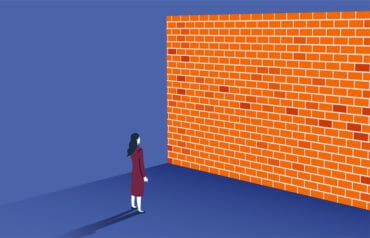When emotional triggers cause uncontrollable outbursts, it can mean burnout.
As lawyers, we all have to deal with unpleasantness. Our careers resemble a noble quest beset by unreasonable people and unexpected results, often at the worst times in people’s lives.
Problems arise when this unpleasantness causes, or triggers, an emotional response in our subconscious that manifests as uncontrollable anger, fear or panic. We can have physical sensations of emotional, physical or mental pain, which, to oversimplify, can lead to anxiety, depression and burnout.
Ideally, our emotional and mental health exhibits confidence, resilience and flexibility. The slings and arrows of outrageous fortune glide off our countenance like water on glass. Unkind comments and criticisms do not bother us, for we are proud warriors serving the innocent and deserving.
In reality, we live in a world somewhere between emotional and mental healthiness and panic or depression. One way to measure mental and emotional health is by our ability to control stress and anger. It is a work in progress. Emotional triggers often blindside us — we don’t expect them. Many of us don’t even know they are there. Once we are triggered, it is too late: Our temper flares, angry words erupt, and we say or do things we regret.
What Triggers You?
It is important to think about why you get angry or scared. Think about the last time you lost your temper, and ask yourself what made you angry. This is the first step to recognizing your triggers and understanding how deeply they are buried.
Most emotional triggers are caused by traumatic events we may not remember.
Now, try to remember the first time you were angry and what made you angry. This is a clue to the source of your triggers. If your trigger is being told “no,” for example, or not getting what you want, then your trigger very likely was installed in your childhood.
As lawyers, we are often told “no,” but the key is how do we react to that? If we get triggered, we will waste a lot of time dealing with a wounded psyche before we can start searching for solutions and get back on track.
Do politics make you angry? Do victims make you angry? Do finances make you angry? Finding solutions is a healthy response. Anger is not. What is the hook that pole-vaults you from rational thinking to raw animal emotions? These are the symptoms of emotional triggers.
Resilience Is the Ability to Adapt to Adverse Conditions and Succeed
When we get angry and fall prey to our emotions, we can become depressed and fatigued. If we get angry on a regular or increasing basis, it often means we are on the slippery slope to attorney burnout.
Being triggered is exhausting.
Think of triggers as emotional hand grenades or landmines (or “land minds”) that live in our subconscious just beneath our rational mind. It may be a traumatic memory, a painful experience or unforgiven behavior by an authority figure. It could be something you witnessed as a child. When something happens that reminds you of that experience, the grenade goes off.
The secret to emotional health and resilience is getting to the bottom of these seemingly uncontrollable outbursts. For example, I used to hate April 15 because I loathed paying taxes. Some years, I had to get on a payment plan with the IRS because I did not have the money to pay them. I could not understand why I would get so upset around April 15, so I started searching my memory banks for the cause of this irrational reaction.
I realized I had a lot of fear associated with money, especially the fear of not having any. In my family, not having money was equal to failure. Thus, I was a failure. There was a simple solution to avoid the stress, anxiety and depression I was experiencing around taxes: I admitted that I was in complete control of my finances and started acting accordingly.
A Work in Progress
Honestly, I have a lot of emotional triggers, healed or yet to be discovered. When I feel anger, fear, panic, stress, anxiety or depression, I know a trigger is lurking just beneath the surface.
Managing my triggers is an ongoing process, but the rewards are worth it. I am calm, confident and composed. My neuroses are my friends. Life is good.
Illustration ©iStockPhoto.com
Subscribe to Attorney at Work
Get really good ideas every day for your law practice: Subscribe to the Daily Dispatch (it’s free). Follow us on Twitter @attnyatwork.

















